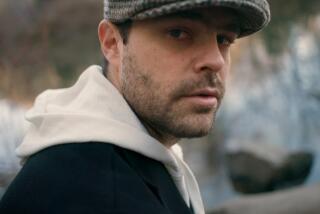Argentina tries to uncover ‘dirty war’ orphans
- Share via
Reporting from Buenos Aires and Bogota, Colombia — They were adopted by a wealthy media family at the height of Argentina’s so-called dirty war. Now the two 34-year-olds find themselves, much against their will, at the center of a national obsession as their country awaits the results of court-ordered DNA tests.
The question: Are they among the 400 children of victims of the military dictatorship who still remain unaccounted for?
The intense emotions surrounding the case show that Argentina is still struggling to recover from the trauma of the internal conflict from 1976 to 1983, when 10,000 to 30,000 people disappeared and are presumed to have been killed by the military junta. Newborns and infants of slain prisoners were commonly put up for adoption.
The current drama centers on Marcela and Felipe Noble Herrera, the adopted children of Ernestina Herrera de Noble, owner of the Clarin media conglomerate. The process of matching DNA samples taken from the siblings’ clothing and toiletries with samples taken from dirty-war victims in the National Genetic Data Bank began Monday. Results are expected within a month.
Advocates for victims of the junta, including the Grandmothers of the Plaza of May, have contended that all adoptive children from the era should be tested and their records be stored in the data bank so that families can be reunited or attain closure on the decades-old disappearances.
The Grandmothers, who get their name from the Buenos Aires plaza where they protested over the missing children of their slain sons and daughters, estimate that 400 of the 500 offspring still have not been found.
But Marcela and Felipe Noble Herrera have said they do not want to find out who are their biological parents, and did not give blood samples to a court-approved lab. Acting under a law passed last year requiring submission of genetic samples in dirty-war cases, police last month raided their family home to seize underwear and toothbrushes from which DNA samples were taken.
Both alleged that they were humiliated by police in the May 28 raid by having to strip before seven officials. “They are trying to break us emotionally,” Felipe Noble Herrera told reporters.
The family’s attorney, Gabriel Cavallo, told reporters Monday that the tests were bound to be tainted, whatever the result, because of the lack of sufficient genetic material from dirty-war victims.
However, Estela de Carlotto, president of the Grandmothers group, issued a statement Monday saying, “Let’s wait for the tests to see if they are relevant or not.” She accused Herrera de Noble of obstructing the DNA testing to hide the provenance of her adopted children.
Herrera de Noble, whose husband died before the adoption, has said that Marcela was left on her doorstep in May 1976 and that she received Felipe a month later. The Grandmothers group has said it believes the children are orphans of people “disappeared” in the dirty war.
Herrera de Noble’s media group is one of South America’s largest, with Clarin newspaper as its centerpiece. The business also includes radio, TV and cable operations. She says the case has been politicized because of the paper’s editorial criticism of President Cristina Fernandez de Kirchner and sensationalized by La Nacion, the competing daily newspaper in Buenos Aires, the capital.
Herrera de Noble was briefly jailed by a judge in 2002 because of an alleged failure to obey his rulings.
Argentina’s Congress passed the law last year forcing all principals in dirty-war paternity cases to submit to genetic testing. If the people involved refuse to give blood samples, the police have the right to raid and search private residences and offices for DNA samples.
In December, Marcela and Felipe Noble Herrera gave blood samples to a separate court lab, with the stipulation that the results be compared only with DNA provided by two families that say they are relatives of their biological parents. They also stipulated that the samples not be given to the National Genetic Data Bank, which they say is unreliable and overly politicized.
D’Alessandro and Kraul are special correspondents. D’Alessandro reported from Buenos Aires and Kraul from Bogota.
More to Read
Sign up for Essential California
The most important California stories and recommendations in your inbox every morning.
You may occasionally receive promotional content from the Los Angeles Times.










